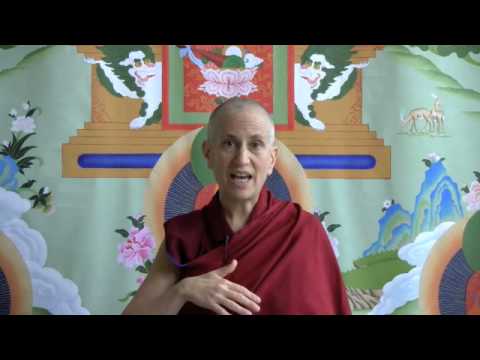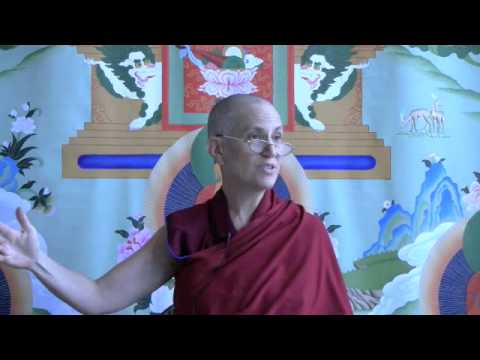Dharma protector practices
Part of a series of Bodhisattva's Breakfast Corner talks given during the Green Tara Winter Retreat from December 2009 to March 2010.
- Some advice regarding Dharma protector practices
- The spirit of Buddhism is to transform our own mind
Green Tara Retreat 018b: Protector practices (download)
Somebody sent in a quote from Kalu Rinpoche. I won’t read the whole quote. It’s basically saying that when you go deeper into practice then obstacles can arise in your mind, and so it’s very helpful to have a Dharma protector that helps you overcome the obstacles. This person is saying that since they started doing the Retreat from Afar, they felt the need to have a Dharma protector although they’ve never had that inclination before. And would I recommend doing a protector practice as part of going deeper into the Tara practice?
I will give you my personal opinion. If I give you the opinion of the Tibetan masters, they say “Yes, doing a protector practice, yes, that’s fine.” My personal opinion, okay? If you’ve read that prayer that is called Longing for Tara, (it’s in How to Free Your Mind ) and where it’s talking about how Tara is the Buddha, and she’s my best friend, and she’s this and that. One of them is Tara is my protector. I think Tara is a fantastic protector. If we’re practicing Tara well, with Tara’s incredible energy, I don’t think we need any other protector.
Also to explain, because this is something that sometimes gets difficult in Tibetan Buddhism and it has become an issue in the entire Tibetan community in general. This whole thing of Dharma protectors and people’s practice—where they shift so much energy on the Dharma protector, and they’re supplicating the Dharma protector as an external being saying, “Please protect me, and please give me this condition, and that good condition, and the other thing.” If people’s practice gets so into that, then they’re really losing the whole spirit of Buddhism which is transforming your own mind.
I’ve heard His Holiness say, because the Tibetans often have these very beautiful altars in their house, and they always keep their precious expensive items underneath the altar, and then there are statues including the statues of the Dharma protectors on top of the altar. His Holiness says, “It’s like you have the statues of the protector on top and you’re asking them to protect all your valuables underneath.” He says this is not the way it should be.
When we ask, “What is our real protector?” Can any external being actually protect us from anything? They might influence some circumstances here and there. But they can’t stop our suffering, because what’s the thing that causes our suffering? It’s our own internal karma. Unless we change our karma and unless we take really deep refuge in the Three Jewels, we could either go to the police, or go to the Dharma protector, or go to our best friend, and ask for help. But if we don’t have the karma, and we haven’t created the virtue, then there’s nothing anybody else can do. If any Buddhas, enlightened beings, could have done it, they already would have. That would have meant that they could do things regardless of what our karma is. But that’s not the case at all.
His Holiness says what really protects us is our refuge in the Three Jewels and our observance of cause and effect. This means keeping our precepts well and getting our act together. If we just want to do Dharma protector practice—and sing in deep voices, and make tormas, and ring a bell, and sound a drum, and wear fancy hats and things like that—but we still continue to lie, we still continue to take things that don’t belong to us, we still continue to spray Raid around the house when we don’t like the bugs, we still continue to deceive people in order to make ourselves look better, we still continue to sleep around just because well everybody does it and nobody’s going to find out. As long as we do those things, how’s anybody else going to protect us? Impossible.
It’s very important that we really look at our refuge and look at our karma, that’s our real protector. If on top on that, you do some protector practice, that’s fine, but I don’t think it’s a big issue. And Tara is great! I mean her joyful energy; and does that protect you from everything! Don’t you agree?
Venerable Thubten Chodron
Venerable Chodron emphasizes the practical application of Buddha’s teachings in our daily lives and is especially skilled at explaining them in ways easily understood and practiced by Westerners. She is well known for her warm, humorous, and lucid teachings. She was ordained as a Buddhist nun in 1977 by Kyabje Ling Rinpoche in Dharamsala, India, and in 1986 she received bhikshuni (full) ordination in Taiwan. Read her full bio.


